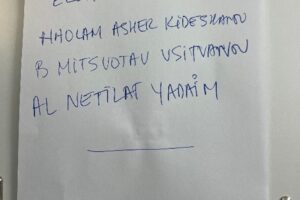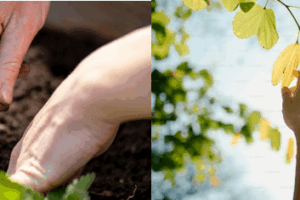- Have you ever found meaning in not knowing?
- Has ignorance ever opened your mind to new possibilities?
As we prepare for Passover 2025, I look forward to reading about the four sons with greater anticipation. When I was younger, I vacillated between my aspiration to be the wise son and my devious exploration of the wicked son. Rarely, if ever, did I feel a connection with the simple son.
This year is different. I used to believe that I knew so much…and that it mattered. I have now discovered the meaning of not knowing. I would like to share my journey of finding inspirations in ignorance.
After 30 years in Boston, I relocated to Miami in late 2022. In the fall of 2023, I celebrated the Jewish High Holidays in Miami for the first time. I vividly remember celebrating Succot at the Chabad in Bal Harbour in September of 2023. It was my first time celebrating Succot without my family. I specifically remember my conversation with Rabbi Sholom Lipskar (Z”L) on that first night of Succot, inside the succah and under the stars.
“Andy, you need to start putting on tefillin every week and try to do so every day.”
Rabbi Sholom Lipskar (Z”L) asked me to promise… I hesitated and did not commit.
Now, I find myself, laying my tefillin 3-4 times per week.
I recently had a conversation with my daughters about what I have learned since I moved to Miami. My tefillin experience unfolds my new learning.
When the Rabbi told me to lay tefillin, I hesitated because I did not know the meaning. Although I still do not fully know the meaning, I sincerely believe in the purpose.
My older daughter, Caroline, taught me this basic lesson when I was about to have a hip replacement. I was full of angst because I did not understand the details of the surgery and how it was possible for my entire hip socket to be removed and replaced and still be able to walk the same day.
Finally, Caroline, who is a medical student, explained. “Dad, you do not need to know all of the recipes at a restaurant in order to enjoy the food. You do not know how an airplane actually flies, but you can still travel”
Caroline’s warm and wise words released my inner requirement to understand with my mind and immediately salved my spirit.
Since I moved to Miami, I have been welcomed by a broader community of Sephardic and African Jews from Morocco, Tunisia, Egypt, Syria, Iraqi, Panama and many other communities that I had not previously celebrated with from my time in Boston which had a predominant Ashkenazi (Eastern European) community.
While I found myself lost amidst newly discovered rituals and customs, I felt myself fully embraced by purely participating.
I have experienced the honor of being the 10th man to enable a minyan for a stranger to say the mourner’s kaddish for their beloved father. Although I did not understand the details or implications in that moment, the gratitude of the family has been everlasting.
I have also learned the power and purpose of prayer – of connecting with God and the community around me.
Let’s explore the story of the Four Sons in Exodus and focus on the simple son in Exodus 13:14:
“In days to come, when your son asks you, ‘What does this mean?’ say to him, ‘With a mighty hand the LORD brought us out of Egypt, out of the land of slavery.”
This direct question and answer of the simple son and his father may be intended to extend a welcoming hand to our broader community. The sincerity of the simple son seeking to learn is the greatest blessing for a teacher who wants to teach. The challenge to respond to a simple question is to be concise and sincere. Personally, brevity has not been my greatest attribute.
While the circle of knowledge has limits, the possibilities of curiosity are infinite.
Prior to moving to Miami, I did not attend Shabbat services. Since October 2023, I have regularly celebrated Shabbat services. Although I do not know understand the specifics of the services or the particulars of the prayers, I feel the warmth of my fellow participants and our sincere desire to connect with each other, with God, and to pray for better tomorrows. I used to think about praying, now I simply enjoy being amongst prayers. Singing songs, and dancing with unbridled joy – simple and sweet.
At our weekly shabbat dinners, I share with my loved one, Joan, friends, and family, I have found a weekly oasis from the outside world. Joan’s Challah, shabbat meal of Moroccan delicacies, and engaging discussion makes for a wonderful respite and bookend for our week. In addition, I seek deeper meaning in the weekly torah portion to explore within myself and how to connect timeless words with the present world.
I recently had a revelation of the purpose of prayer. I was out for dinner on a Saturday evening at a restaurant in Miami. At the end of the meal, I felt an impulse to send my two daughters a text. I had been missing my daughters very much and earlier that morning at shul (temple), we the “yismachu” prayer which I had not heard in many years. I did not even understand the words or the meaning of the prayer. I was merely mesmerized by the tune and staccato cadence of the rhythmic chanting. Nevertheless, the tune felt as familiar as if I had heard it yesterday. I remembered singing this prayer with my daughters all those years ago. Inspired by this memory, I spontaneously recorded a video of me singing. I immediately sent it to our “Father Daughter Daughter Chat Group” at 11:15pm ET. Within 15 minutes Lucy replied with her own video recording. After another 15 minutes, Caroline chimed back in unison.
You can watch our yismachu singing here.
It was precisely at that moment that I understood the potential of prayer. For me, it was not about the words or the meaning. It was about the desire to connect with others – in this case with my daughters – and to immediately feel a reciprocal connection – spontaneously and free of judgment.
I played the video of me and my two blessed daughters chanting the yismachu over and over again that week.
Someone once told me:
You may forget a lifetime of facts, but you will remember feelings for a lifetime.
I knew in that moment, that I felt a lifetime of blessings.
Appendix A:
On May 4, 2025, Rabbi Sholom Lipskar passed away. I will be forever grateful to Rabbi Sholom Lipskar (Z”L) for teaching me the purpose of prayer and tefillin. I will forever remember his teachings.
You can listen to some of Rabbi Sholom Lipskar’s (Z”L) words of wisdom here:
Please watch the incredible development of The Shul in Bal Harbour and the vision and vitality of Rabbi Shlomo Lipskar (of blessed memory).
Appendix B:

This is a photo of my teffilin and teffilin case. My Hebrew name is written “Avram ben Zvi” (Avram son of Zvi – my father Dr. Harold Goldfarb is a Zvi.) My teffilin originally belonged to my great grandfather Max Fish.
I am also grateful to my friend Koby who helped me lay my teffilin for the first time and helped begin my weekly practice.

The Four Sons by Arthur Szyk (1894-1951)
Arthur Szyk (1894-1951), is considered today to be one of the greatest modern artists to work in the style of medieval illuminated manuscripts. Szyk undertook his greatest project, the Haggadah, between 1934 and 1936 while living in Poland. It was his masterpiece, and something he was urgent to share.
When first published in 1940, each copy sold for $500 (the equivalent of $8,800 today), making it one of the most valuable books produced in the 20th century. The Szyk Haggadah was described by the London Times as “a book worthy to be placed among the most beautiful of books that the hand of man has produced.”
Appendix C
Enjoy a haiku inspired by this blog:
Simple son seeks truth,
Ignorance sparks wisdom’s light,
Questions guide the way.





